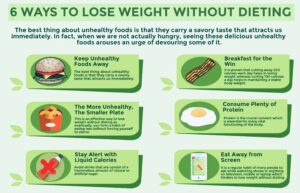How to Lose Weight Without Dieting: Natural, Sustainable Tips That Work
Last Updated: April 5, 2025
Did you know that over 45 million Americans start a new diet every year — yet most regain the weight within a year? If you’re tired of restrictive meal plans and calorie counting, you’re not alone.
The good news? You can lose weight without dieting by making small, sustainable lifestyle changes. This guide will show you how to drop pounds naturally using proven strategies like better sleep, mindful eating, and smart movement — all without feeling deprived.
We’ll cover everything from the psychology of hunger to daily habits that support long-term weight loss. Whether you’re looking to lose 10 pounds or 50, this article gives you a clear roadmap to success — no crash diets required.

Why Traditional Diets Fail

Diet culture tells us that losing weight means cutting calories, eliminating food groups, and pushing ourselves through punishing workouts. But here’s the truth: these methods rarely work in the long run.
- Diets are unsustainable: Most people can’t stick to strict rules forever.
- Mental fatigue: Constantly tracking food leads to burnout and bingeing.
- Metabolic damage: Severe calorie restriction can slow metabolism over time.
Rather than focusing on short-term fixes, we should aim for long-term habits that support a healthy relationship with food and body.
How to Lose Weight Without Dieting: A Step-by-Step Guide
1. Prioritize Protein and Fiber-Rich Foods
Instead of counting calories, focus on nutrient-dense foods that keep you full longer:
- Eggs
- Greek yogurt
- Leafy greens
- Legumes
- Whole grains
These foods help regulate appetite and blood sugar levels, reducing cravings and overeating.
2. Drink More Water Throughout the Day
Staying hydrated can help reduce overall calorie intake. Sometimes, what feels like hunger is actually thirst.
Try these hydration tips:
- Drink a glass of water before meals
- Add lemon or cucumber for flavor
- Carry a reusable bottle as a reminder
3. Practice Mindful Eating
Mindful eating involves paying attention to your food and your body’s signals. Here’s how to get started:
- Eat slowly and chew thoroughly
- Turn off screens during meals
- Check in with yourself halfway through eating
This practice helps you recognize when you’re truly full, preventing mindless overeating.
4. Move More — Not Just at the Gym
You don’t need to spend hours at the gym to lose weight. Small increases in daily activity can add up:
- Park farther away from stores
- Take the stairs instead of the elevator
- Walk while talking on the phone
Research shows that non-exercise activity thermogenesis (NEAT) — things like fidgeting and walking around — can significantly boost calorie burn throughout the day.
5. Get Enough Sleep
Sleep deprivation disrupts hormones like ghrelin and leptin, which control hunger and satiety. Aim for 7–9 hours per night to support weight loss.
Try these sleep hacks:
- Stick to a consistent bedtime
- Avoid blue light before bed
- Create a relaxing pre-sleep routine
Best Practices for Long-Term Success
If you want to maintain your weight loss, consistency is key. Here are some best practices to follow:
- Track progress holistically: Use measurements, energy levels, and mood — not just the scale.
- Plan ahead: Prepare healthy snacks and meals to avoid impulsive choices.
- Build a support system: Share your goals with friends or join an online community.
Common Mistakes to Avoid
Even with the best intentions, many people make mistakes that sabotage their progress. Here are a few to watch out for:
- Over-restricting: Cutting out too much too fast leads to cravings and binges.
- Neglecting mental health: Stress and emotional eating can derail even the best plans.
- Comparing yourself to others: Everyone’s journey is different — focus on your own progress.
Expert Insights & Real-Life Examples
Experts agree that sustainable weight loss comes from behavior change, not temporary fixes.
“The most successful weight-loss strategies involve gradual lifestyle changes rather than drastic restrictions.” – Dr. Lisa Young, Registered Dietitian
Case Study: Sarah’s Journey
Sarah, a 34-year-old teacher, struggled with yo-yo dieting for years. After switching to intuitive eating, drinking more water, and adding daily walks, she lost 22 pounds in six months — without ever going on a “diet”.
FAQs About Losing Weight Without Dieting
Q: Can I really lose weight without dieting?
A: Yes! By improving sleep, increasing movement, and eating whole foods, you can lose weight naturally.
Q: What foods help with weight loss without dieting?
A: High-protein and high-fiber foods like eggs, vegetables, legumes, and lean meats help you feel fuller longer.
Q: Is exercise necessary for weight loss?
A: While not mandatory, physical activity supports overall health and can enhance weight loss efforts.
Q: How does sleep affect weight loss?
A: Poor sleep disrupts hunger hormones and increases cravings for unhealthy foods.
Q: What if I slip up or have a bad day?
A: One off-day won’t undo your progress. Focus on getting back on track the next day.
Q: How long does it take to see results?
A: With consistent lifestyle changes, many people begin to notice results in 4–6 weeks.
Q: Should I track my food or calories?
A: Tracking can be helpful for awareness, but it’s not required. Focus on balanced meals and listening to your body.
Final Thoughts: Your Journey Starts Today
Losing weight doesn’t have to mean misery, deprivation, or extreme routines. By adopting small, sustainable changes, you can achieve lasting results without dieting.
Remember, weight loss is about progress, not perfection. Celebrate each healthy choice, and don’t let setbacks discourage you.
Now it’s your turn: Have you tried any of these strategies? Comment below with your thoughts or questions!
External Sources
Internal Links
- Mindful Eating: How to Eat with Awareness
- Sleep and Weight Loss: What You Need to Know
- NEAT: How Daily Movement Helps Burn Calories